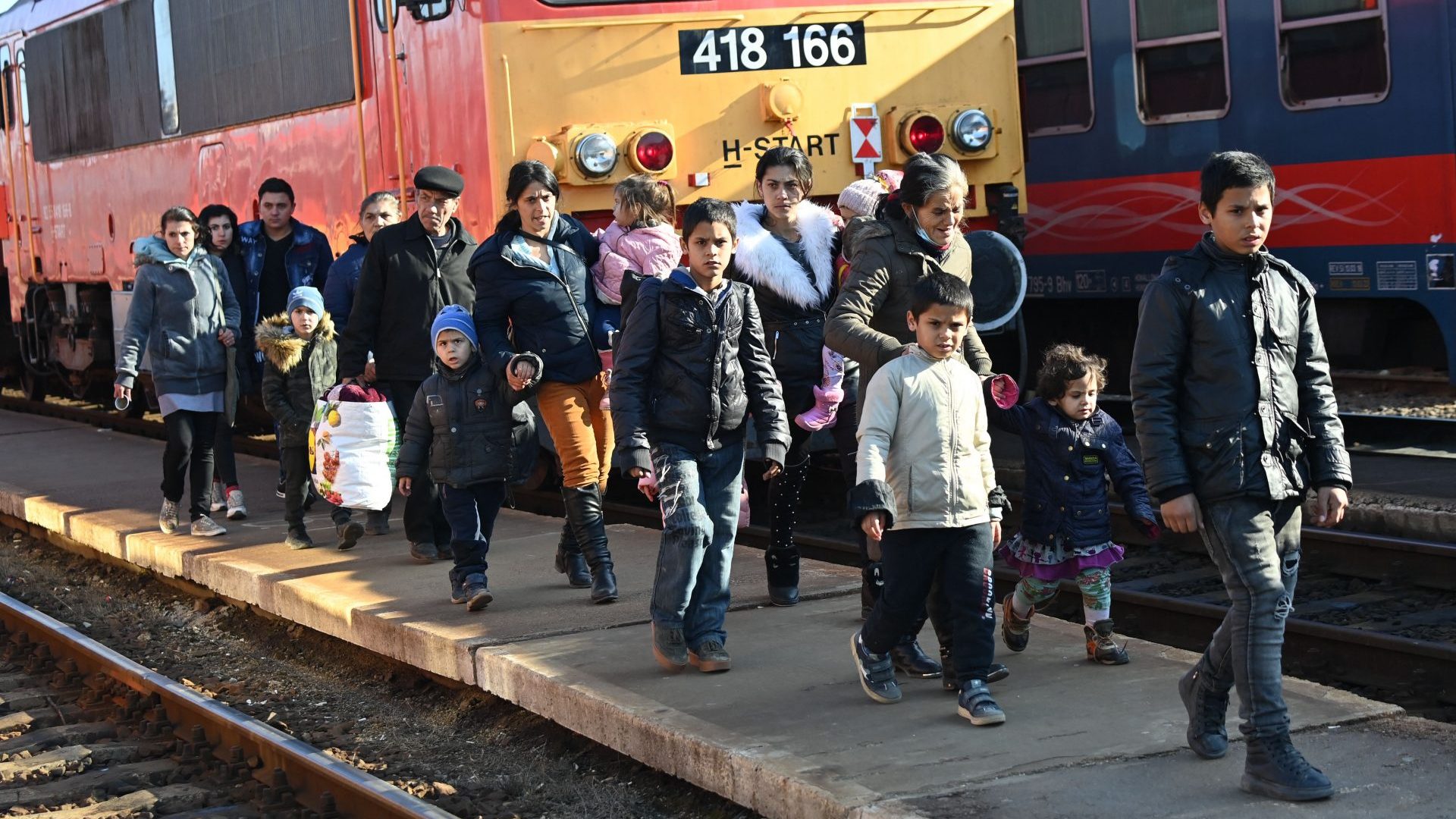Let’s give some credit where it is due: The British response to the invasion of Ukraine has gone from embarrassingly weak (like the EU and America) to verging on the acceptable, if not yet strong enough, in terms of sanctions and diplomacy.
Yet one aspect illustrates perfectly why, as a previous correspondent to your Letters pages has said, the sickness in the Conservative party goes far beyond Boris Johnson. It is our response to those displaced by this crisis.
While our neighbours are opening their borders and their hearts – even nationalist Poland seem to be doing its bit – we are asking Ukrainians to jump through bureaucratic hoops. The tweet by Tory minister Kevin Foster suggesting that refugees could apply for a seasonal work visa is a sick joke that deservedly makes us a laughing stock throughout Europe.
Dennis Sheedy
There’s no profit to be gained from helping these desperate people. However, there is good money to be made from sending armaments to Ukraine, which is exactly what they are doing. Proof, if any were needed, of where this rotten Tory government’s priorities lie.
Graeme Brown
Via Facebook
Our absurd demands on those seeking to come to Britain from Ukraine is a reminder that we need a sensible national conversation about the many benefits that migrants bring to Britain.
I know Keir Starmer is scared of his own shadow, and of anything to do with migration from Europe that might be open to wilful misinterpretation by the right wing of the Conservative party, but with large sections of the population in favour of taking more refugees, there will never be a better time to make the case.
Meg Hart
Coventry
As he briefly broke off from flak jacket photo opportunities to urge EU leaders to cut Russian banks out of the Swift payment scheme, did it occur to Boris Johnson that this kind of thing might have been easier if Britain still had a seat at the family table, rather than having to ring in like a distant, disgraced cousin?
Sarah Sharp
Leeds
China’s choice
Paul Mason (“West can’t win against Putin and Xi unless we renew ourselves”, TNE #281) correctly points to the threats a Russian-Chinese political and military pact poses for the survival of liberal democracies not only immediately in Ukraine and her eastern European neighbours but throughout all free nations.
History, however, suggests that Sino-Soviet relationships have been marked as much by mutual distrust as by co-operation and that current displays of friendship mask deep-rooted cultural differences and territorial tensions. While both nations inherited a 20th-century Marxist revolution and ideology, with a common enemy, the West, they evolved very differently, with Maoist often French-educated leaders in Beijing regarding Russian communist society as “crude” and dangerously expansionist.
These fears partly triggered the Sino-Soviet split in the late 1960s leading to conflicts and near all-out war over disputed lands along the Ussuri River near Manchuria.
While Chinese relations with the West have themselves deteriorated appreciably over the past decade, it seems hardly conceivable that China would risk being caught in the backdraft of the West’s sanctions against Russia. China’s abstention in the recent UN Security Council condemnation of Russian aggression may yet signal that China refuses to pay the price for Putin’s folly in a land remote from their sphere of influence.
Paul Dolan
Northwich, Cheshire
Wrong fix
The headline sounded great (“Time running out to fix democracy”, TNE #281), but it turns out James Ball just wants democracy to continue to be “fixed” in the bad old way.
Proportional representation (PR) aims to ensure that numbers of seats reflect the votes cast. Is that too much to ask? Can any true democrat really advocate retaining disproportional representation (DR)? DR has given us a century dominated by majority Tory governments elected by a minority of voters. Thatcher, Brexit and Johnson would probably never have happened under PR.
As for decisive government, Cameron and Johnson have been object lessons in how to be very decisively wrong. Better take more time, and get it right.
James Ball suggests that proportional representation tends to favour candidates who toe the party line over independently minded candidates because it’s party leaders who decide the order in which candidates appear in party lists on the ballot paper and therefore their likelihood of being elected.
However, even if evidence were produced to support that assertion, it could only really apply to PR with “closed” lists, the system used to elect the regional members in the Scottish and Welsh parliaments and – before Brexit – British MEPs. In PR with “open” lists, voters are able to affect the order in which candidates from a party are elected, while the single transferable vote, the method used in all elections in both parts of Ireland and in Scottish local elections, allows voters to choose between candidates of their preferred party and to rank candidates of other parties on the ballot paper.
Ian Stevens
Leamington Spa
We in the Labour Campaign for Electoral Reform don’t believe in any of the straw-man arguments on PR put forward by James Ball. We are in favour of keeping the constituency link and see PR as a necessary step to fix our democracy, but it is by no means a panacea. However, evidence from Europe strongly suggests that PR leads to more progressive policies and helps keep them there.
And it is also worth noting the only other country in Europe that still uses FPTP. It’s Belarus.
John Doolan
Labour Campaign For Electoral Reform
I’d like to add one more to James Ball’s seven prescriptions: control political party funding.
I suggest, first, that party treasurers should be subject to the same inquiry and record-keeping requirements as businesses subject to anti-money laundering legislation, and, second, a tax on donations to registered parties.
At, say, 33%, the tax collected would be distributed in the same way as Short money, among all parties other than the intended recipient, to provide some equality of arms between those that find it easy to raise huge sums and the rest.
Tim Gibbons
Dido’s dough
Mandrake (TNE #281) tells us that Dido Harding “began drawing up plans for a three-tier stone amphitheatre-style seating area in the garden of her £2m Grade II listed North Somerset estate. But, she spent her own money this time, and not the taxpayer’s.”
Nope. This was never her money; it’s the undisclosed amount profligately handed to her for running, or is that ruining, Test & Trace.
Ken Russell
Via Facebook
Zellerbration
To save Tim Walker from a wait for a Florian Zeller play about death and bereavement (“Dangerous Liaisons The Double”, TNE #281), I draw his attention to The Height of the Storm.
Bernard O’Sullivan
Via Facebook
Despite Tim Walker’s criticisms (“The Heights Of Folly”, TNE #280), Wuthering Heights at the National is an inventive, energetic take on a novel that (even for its fans) has its flaws. I hope this doesn’t put people off going to see the show.
Hilary Fraser
Via Facebook
The set, music, direction, it was all wonderfully creative and the time flew by. I was sat near to a school group and they were enthralled.
Kirsten Dixon
Via Facebook
Truss busted
It’s surprising that Liz Truss (“The prat in the Russian hat”, TNE #281) is a serious contender to lead the Tories. David Laws in his book Coalition observed that as a junior minister she had little time for dissent and tended to request evidence that did not fit her own views to be set aside. Others have described her as lacking vision, uncompromising and a self-publicist interested in just her own profile.
Such baggage, as proved by the prime minister, is unlikely to rule out Truss for the top job, with her portrayal of herself as another Margaret Thatcher going down well with Tory members. Indeed, sections of the party, labelled by a previous chairman as an “English nationalist, populist, Johnsonian cult”, no doubt see her as the best person to achieve – in defiance of the “Blob” (TNE #280) – their aim of transforming Britain into a “Singapore upon Thames”.
If there is a contest, expect Tory constituencies to pressure their MPs to vote her into the final stage when members have their say. Against Rishi Sunak, she might well win – which is why, to stop her, the party’s MPs may decide to stick with Johnson.
Roger Hinds
Coulsdon, Surrey
Liz Truss used to be a Lib Dem before she was a Tory. She used to be a Remainer before she was a Brexiteer. I’m even told she was foreign secretary before her new Zoolander-style career as a model, doing her “blue steel” pout whenever she puts on a furry hat or spots a flag.
Kate Perry
Mitch Benn offers a list of five inanimate objects that could do a better job than Liz Truss. Only five? He’s being too kind.
Gerry McCarton
Via Facebook
Ties that bind
In her report on Kaunas (“Old City, New Life”, TNE #280) Kirsty Lang says: “For a brief period between 1920 and 1940, Lithuania was under Polish control.” But links are closer than that.
In 1386 the Lithuanian pagan queen married a Polish king, converted to Catholicism and thus cemented a union between the two countries.
The Polish national poet Adam Mickiewicz was a student at the University of Vilnius, and when in exile in Paris, he opened his epic poem Pan Tadeusz with the lament that he had lost his native Lithuania. Later, key Polish figures like Marshal Piłsudski and the poet Czesław Miłosz were also born there.
Adam Czerniawski
Monmouth
Growing pain
In “To Have And Have Not” (TNE #279), Suna Erdem paints an informative but one-sided view of the world’s growing migration crisis.
Far too many people simply have no concept of the impact of ever-growing human numbers on climate breakdown, food security, critical infrastructure costs, schools, housing, biodiversity loss, pollution and declining energy reserves. Not because the evidence is not there, but because it doesn’t suit their world view, which sees growing populations and ever more economic growth as “positives”.
Over-consuming developed countries now face the prospect of being overwhelmed by global migration and increasing inability to provide food aid to failing states.
High fertility and failing states such as Madagascar, which has destroyed over 90% of its amazing biodiversity, are even more open to collapse as declining energy reserves to transport food aid are compromised. There is no social justice on a wrecked planet.
There are many imaginative ways we can deal with this crisis, but we urgently need to rethink an out-of-date Human Rights Act to safeguard our ecological future.
Brian McGavin
Wilmslow, Cheshire



